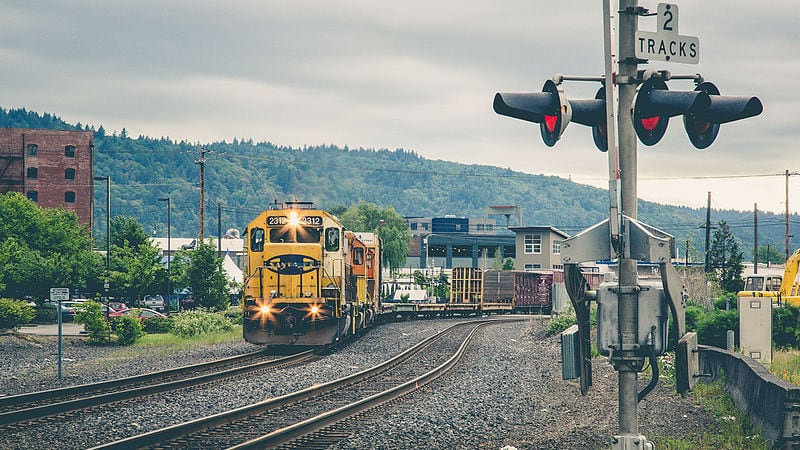During the last two days of the 2019 legislative session, the Oregon Senate passed three notable environmental bills.
The wins came as House Bill 2020, the cap and trade legislation championed by Democrats and Gov. Kate Brown, was pronounced dead. And environmental justice groups are critical, saying lawmakers made compromises that won't necessarily solve the problem they were meant to address.
Related: Gov. Kate Brown Says She Is Prepared to Use Executive Powers to Push Carbon Cap Legislation
On Saturday, the Senate passed House Bill 2209, which requires railroad companies to do more to prepare for oil spills. And on Sunday, the Legislature passed House Bill 2007, which will regulate diesel trucks in the Portland metro area, and Senate Bill 792, which increases supervision of auto dismantlers.
Related: Scrapyard bill passes, but advocates are unimpressed.
Sen. Michael Dembrow (D-Portland), who sponsored both the oil train bill and scrapyard bill, says the new pieces of legislation are big environmental wins that may not have been achieved without the friction created by House Bill 2020.
"I hate to say this, but it may have helped that HB 2020 went down," Dembrow says. "These three important bills were able to slip through. They're all really important, especially for low income people who live in areas of greatest risk."
HB 2209 requires railroad companies to have oil spill contingency plans and to create funds dedicated to any potential oil cleanups.
Environmental advocates like Michael Lang, conservation director for Friends of the Columbia Gorge, say that the bill will help communities and first responders be better prepared for spills, but it could do more.
He says HB 2209 doesn't require railroad companies to have a worst case scenario plan that accounts for all the oil in the train spilling, but defines worst case as 15 percent of the train's load.
He adds that companies are also not required to give advance notification of oil trains coming through Oregon, nor to track how many trains and how much oil is funneled through the state.
"All I can say is that it took Oregon four years to pass what Washington did in one session in 2015," Lang says. "Nevertheless, persistence pays off and credit where credit is due, there was a lot of bipartisan support on this bill."
SB 792, a response to the junkyard fire that sent toxic fumes billowing over North Portland last summer, tightens previously lackadaisical regulations on auto dismantlers.
But Verde, a local environmental non-profit that opposed the bill, says SB 792 leaves open loopholes that allow scrapyard operators to continue bad behavior.
Oriana Magnera, climate and energy policy coordinator for Verde, says, "The bill did not close the loophole that initially led to problems around NW Metals and has made it difficult for the Department of Environmental Quality to create any accountability."
She says the bill requires auto dismantlers to get a tire waste permit instead of a solid waste permit, which would apply to vehicles and help stop dangerous fluid leakage and keep cars from being stacked too high. Another problem, she says, "is that tires can just be moved to a different site to avoid additional oversight from DEQ."
HB 2007, on the other hand, requires diesel truck drivers that operate in the Portland metro area to replace vehicles with newer engines by 2025.
Dembrow says the diesel bill will use settlement money from Volkswagen, which was forced to pay millions of dollars to various state agencies after cheating on diesel emissions tests, to help minority- and women-owned businesses retrofit and purchase new equipment.
Morgan Gratz-Weiser, legislative director for the Oregon Environmental Council, says HB 2007 is "a really strong first step addressing diesel pollution," and that the group intends to work to expand the bill to be applicable statewide in future sessions.
Dembrow says that, "all three [bills] really are testaments to an improved attitude toward the Department of Environmental Quality within the Legislature."
"The DEQ would like to be able to do its job," Dembrow says, "but the Legislature hasn't given it the funding or positive support needed. Now we see things are starting to turn around."
Magnera is more critical of lawmaker's efforts.
“Very few environmental bills passed, and none that were led by environmental justice organizations or communities of color in the environmental space passed,” she says. “It speaks to a bigger failure of the Legislature to address issues related to environmental justice at all.”

